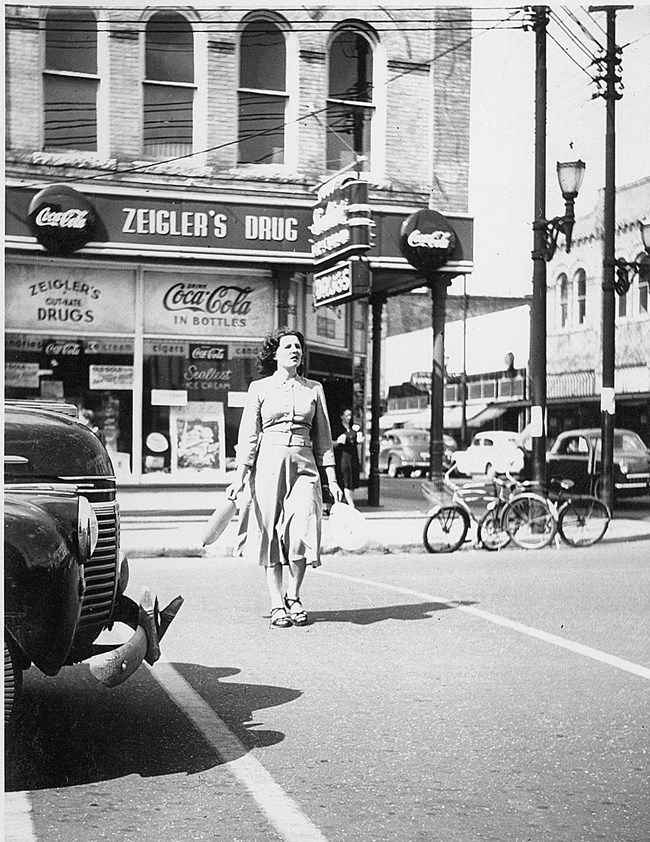Last updated: June 6, 2023
Article
Case Study: Zeigler’s Drug Store/Allen’s Hall, Florence, South Carolina

Photo: Lucas Brown, Kickstand Studio

Photo courtesy: Ken Jackson
History and Downtown Context
This two-story, brick, corner building, constructed in 1876, features arched windows, a decorative band of corbeling, and a distinctive parapet. It was originally a general merchandise store operated by James Allen. On the second floor, Allen established Florence’s first civic gathering spot, Allen’s Hall, as it quickly became known. At one time the building also served as the office of a local newspaper. The YMCA, the Masonic Lodge, religious and political groups all met at Allen’s Hall, and it was also the scene of weddings and other community celebrations.
Devastating fires in both 1893 and 1896 gutted much of Florence’s commercial district. Although this building was damaged, it was not destroyed, and it was rebuilt serval years later, at which time Zeigler’s Drug Store was established. Pharmacist R.H. Zeigler, who also served as Mayor of Florence, operated the drug store for more than 50 years. People gathered here every Saturday to listen to Pete Thornell’s live, Super X radio broadcast on WOLS.
Like many towns across the country in the last decades of the twentieth century, Florence’s downtown commercial district fell victim to suburban shopping malls. During this period a variety of tenants occupied the building, some of whom made alterations to the facade to “modernize” it, such as covering the building in pink stucco and replacing the arched windows with larger, rectangular ones. Eventually the building fell into complete disrepair and was vacant for many years until a group of local developers acquired it and several neighboring buildings in 2013.
Scope of Rehabilitation
After more than a year of planning, the New Florence Development Group began rehabilitation of the historic building. The stucco was removed to reveal the original brick façade that was repaired where necessary, cleaned, and restored. The original arched window openings were restored, and on the first floor the still extant cast-iron columns at the corner entrance were preserved and the storefront recreated based on historic documentation. On the interior, original pressed metal ceiling panels, hardwood floors, doors, and counters were refurbished. The lower level of the building was converted into Town Hall, a 5,800-square-foot restaurant, which specializes in serving locally grown ingredients and also has a large wood burning grill. The second level is occupied by a large real estate firm.
Role of the Historic Tax Credit
According to the developer, the cost of renovating the historic Zeigler’s Drug Store, in comparison with the local rental market, would have been too risky. The tax credit equity was critical to the financing of the project. Equity investors were attracted to partner in the project by the ability to use the Federal HTCs, South Carolina HTCs and the South Carolina Abandoned Building Credit to offset their corporate tax liability.
Economic Impact on Florence
"The Zeigler’s Drug Store historic rehabilitation into the Town Hall restaurant and upper-level office space is a key component that breathed new life into downtown Florence," said Ray Reich, Florence Downtown Development Director. "The project provided momentum, attention and foot traffic to the development company’s neighboring apartment and rooftop bar historic redevelopment on the same block. Together with a handful of other historic tax credit redevelopments, a downtown renaissance is taking place in Florence. These historic projects are catalyzing investment and future development. Downtown Florence is becoming a regional destination, attracting both locals and travelers from the interstate, to the downtown area, for a unique but authentic experience."
Learn More:
Fiscal Year 2017 Highlights and Reports
- Federal Tax Incentives for Rehabilitating Historic Buildings Annual Report
- Annual Report on the Economic Impact of the Federal Historic Tax Credit Additional Case Studies
-
Equitable Life Insurance Company of Iowa, Des Moines, Iowa: The rehabilitation of the Equitable Building has had a noticeable economic impact on downtown Des Moines. The use of historic tax credits allowed the developer to transform a building, underutilized or vacant for almost a decade, into a vibrant place for hundreds of people to reside and work.
-
Owyhee Hotel, Boise, Idaho: Located in the west end of downtown, the hotel was in an area that had experienced little new investment in recent decades and was surrounded by many underutilized and undeveloped properties. The rehabilitation of the Owyhee, however, has enlivened this area and spurred significant new investment by neighboring property owners.
-
Houma Elementary School, Houma, Louisiana: The development of Academy Place Apartments has been a boon to the community which was severely lacking in available senior housing. The project has returned a vacant building once again to active use - this time as mixed-income senior housing.
